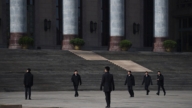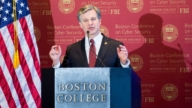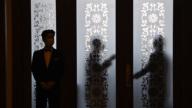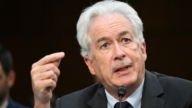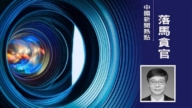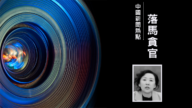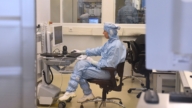【新唐人2014年12月01日讯】最近,中国律师联名签署一封公开信,要求中共全国人大取消日前刚刚经过初审的一项有关“扰乱法庭秩序罪”的法律条款。律师们认为,该条款定义含糊不清,很容易被各级政府官员滥用,拿来打压维权律师,令其噤声,甚至被抓捕入狱。请看报导。
11月3号,中共全国人大在其官网公布了《中国刑法修正案(九)(草案)》。其中第三十五条对原有的“扰乱法庭秩序罪”进行了添加,将“侮辱、诽谤、威胁司法工作人员或者诉讼参与人,不听法庭制止的﹔有其他严重扰乱法庭秩序行为的。”新增为犯罪。
这一新规在公示之后,立即引发大陆律师界的质疑和抗议。律师们认为,这一条款定义非常模糊,在中国大陆司法不公正、法官听命于各级政府官员的环境下,该条款很容易被滥用,使律师本来就很受限制的辩护权,进一步被挤压。
广东维权律师隋牧青:“这一条规定很明显是针对人权律师而来。因为它这种入罪就非常容易,比如说:它只要认定你有所谓‘威胁’或者所谓‘侮辱性的语言’等等,它就可以给你定罪。”
参与联署公开信的广东维权律师隋牧青解释说,目前在大陆的法庭上,尤其是涉及到公权力时,法官通常连话都不让律师说。如果律师抗议,很容易就发生一种言语冲突。那么按照人大的这一新规,法庭就可以轻易把律师抓起来判刑。
隋牧青:“这种规定出台,我们作为人权律师不可能不反它。否则的话你以后做任何案件,你只能配合当局,否则的话你就准备去坐牢。在公权力没有得到有效约束以前,这种规定的出台就是一个法制上的极大倒退。”
《德国之声》引述《法新社》报导称,在中国,数百名律师联名发声的有组织抗议十分罕见,这份有529位律师签名的公开信,目前已上交到中共全国人大。
东南大学法学院教授张赞宁:“辩护律师和公诉人的法律地位应该是对等的。公诉人有什么权利,律师也应该有同样的权利,现在新的《刑事诉讼法》有很多对律师不公正的一些规定、限制律师权益的规定。”
东南大学法学院教授张赞宁表示,除了辩护权之外,律师的调查权也受到很大限制,律师的调查居然需要获得公诉方——检察院的批准,这简直是天大的笑话。
北京市衡卓律师事务所的朱爱民律师则谈到,中共人大这一新规定存在一个明显漏洞,就是当法官和他人发生冲突的时候,到底由谁来界定“扰乱法庭秩序罪”。
北京市衡卓律师事务所朱爱民律师:“如果把这个认定权交给了法院,那么无形中加大了法院的自行裁量权。法官的自行裁量权就比较大,这显然会做出对对方不利的判定。”
《德国之声》报导,中共人大会议称:要创立所谓“具有中国特色的法律规则”,这似乎意味着,中共要加大对法院的控制,而不是加强司法独立。
近年来,中共对协助民众维护正当权益的律师,不断加大打压力度,殴打、非法限制人身自由、吊销律师执照、甚至抓捕入狱等几乎已经成为常态。
今年3月份,唐吉田、江天勇、张俊杰、王成4位律师,前往黑龙江省佳木斯市的建三江农垦总局青农山农场的“法制教育中心”,也就是“洗脑班”,要求释放被非法拘押的法轮功学员,结果被当局无理殴打抓捕,从而引发全国众多律师、民众前往声援,造成轰动一时的“建三江”事件。
但这也只是中国大陆的党大于法、司法不公的冰山一角。公民正当权益被随意剥夺的情况比比皆是。11月27号,中国著名维权人士郭飞雄在广州法院就被法官抢走陈述材料,并被剥夺了最后陈述的权利,甚至连律师上厕所也被全身摄像。
采访/易如 编辑/李谦
More than 500 Lawyers Signed a Public Letter in Protest Of Injustice Law Amendment
Recently, more than 500 Chinese lawyers jointly signed
a public letter demanding changes
to a criminal law amendment.
The amendment draft, which makes changes
to the definition of the “disrupting court order" crime,
was announced by the National People’s Congress (NPC)
this month.
The letter states that the ambiguity in the proposed
amendment can be used as a tool of power abuse
by governmental officials.
Rights lawyers will be more easily silenced
or even arrested.
Let’s look at the following report.
On Nov. 3, the Chinese Communist Party’s (CCP) NPC
released on its website “the Ninth (Draft) Amendments
to the Criminal Law".
In Article 35, the draft makes changes to definition
of the crime “disrupting court order".
It adds, “insulting, defaming, or threatening a judicial officer
or participant to the litigation" and “engaging in other acts
that seriously disrupt the order of the court"
to the circumstances covered under the crime.
The changes were soon questioned and protested
by Chinese lawyers upon release.
Lawyers said the language of the new terms
are too ambiguous.
This can easily lead to abuse in mainland China where judicial
justice is lacking and judges follow party officials’ orders.
The already severely restricted rights of defense lawyers
will be further oppressed.
Sui Muqing, Guangdong right lawyer: “This term is obviously
directed against rights lawyers, as it can be easily used
to convict us of such crime.
For example, you may be put into prison as long as they claim
any of your speech is a threat or insult to judicial officers."
Sui Muqing has signed the joint public letter.
Sui said the reality is, sometimes lawyers are not even
allowed to say anything in a CCP court trial,
especially for a case involving public power.
If lawyers challenge the judge, this usually leads
to verbal conflicts.
According to the new term in the NPC amendment,
now CCP courts can easily sentence any lawyer
who verbally challenges them.
Sui Muqing: “As rights lawyers, there is no way
we can accept it.
Otherwise the only thing we can do in the future
is to do whatever the CCP asks or be prepared
to be put into prison.
Without any effective constraint over public power,
such an amendment is simply a great retrogression
in rule of the law."
A Deutsche Welle report quoting AFP said organized
protest by hundreds of lawyers is rarely seen in China.
The letter, with 529 lawyer signatures,
has been delivered to the NPC.
Zhang Zanning, professor of law at Southeast University,
China: “Lawyers and procurators should be equal
in legal status.
Lawyers should have all rights that procurators have.
However, the amended criminal law adds many injustice
terms that make constraints over lawyers only."
Zhang Zanning said that besides rights of defense, lawyers’
rights of enquiry are also greatly constricted.
Any enquiry by lawyers has to be approved
by procuratorates, which is horribly ridiculous.
Zhu Aimin, a lawyer at Beijing Hengzhuo Law Firm, said there
is a significant flaw in the CCP’s amendment of criminal law.
That is, who has the power to define “disruption of court
order" when the judge himself clashes with others?
Zhu Aimin: “If the power is given to court, that virtually gives
more discretionary power to judges.
It will be easier for them to make unfavorable court
decisions against the accused."
Deutsche Welle said the NPC meeting claimed that they
attempt to set up “legal rules with Chinese characteristics".
This may suggest the CCP prefers more control over courts
instead of improving in judicial independence.
In recent years, the CCP continues to press harder on lawyers
who stand for legitimate rights of Chinese citizens.
It has become normal to see lawyers beaten or illegally
detained, having licenses revoked or even jailed.
This March, Tang Jitian, Jiang Tianyong, Zhang Junjie
and Wancheng, all lawyers, visited a so-called
“legal education center", or brainwashing center, located
at Qinglongshan Farm, Jiansanjiang of Heilongjiang Province.
They demanded the release of an illegally detained
Falun Gong practitioner, but were beaten and detained
by local CCP officers.
Following that, many Chinese lawyers and civilians
went to Jiansanjiang to voice support for those four lawyers,
resulting in the sensational “Jiansanjiang incident".
The sad truth is the incident only reveals a tip of the iceberg
in judicial injustice under the CCP’s one-party dictatorship.
Cases of arbitrarily violating citizens’ legal rights
can be seen everywhere in China.
On Nov. 27, the famous Chinese rights lawyer Guo Feixiong
was tried in a Guangzhou court.
In the trial, the judge directly took away Guo’s defense
materials, and deprived Guo’s right to make a final statement.
Furthermore, Guo’s lawyer was subjected to whole-body
camera filming even in the restroom.
Interview/YiRu Edit/LiQian



